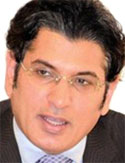Building a New Arab Mindset

By Mohammed Fahad al-Harthi
11 February 2015
What has happened to the Arab world? If looked at objectively, it appears that people here have become numb to the images of wanton destruction, death and bombings served up to them daily on news channels.
People’s lives are now measured in numbers by media houses — the more people killed, the bigger the story. We receive this type of news with disturbing coldness, as if nothing had happened.
It is also clear that many have become indifferent to the news because they are busy dealing with the pressures of daily life and trying to make a living. In this state of mind, and even though they could easily have been the victims, they regard events around them with a kind of suspended belief. It is as if they are watching a work of fiction.
Bizarre Reaction
There was a bizarre reaction recently to the ugly murder of Jordanian pilot Maaz al-Kasasbeh by members of ISIS. There seemed to be a greater uproar over the way he was killed, rather than the murder itself, which was treated as if it were the norm. The video went viral, much like a scene from the latest Hollywood blockbuster.
The hard and bitter reality is that the Arab world faces an alarming future, beset as it is by militias, wars, gangs and failed states. How has this happened and when will it end? Putting aside conspiracy theories for the moment, we know that the failure by many states to achieve economic and political development has led to this current malaise. Many Arabs are deeply negative, have lost their way and are only concerned with their immediate problems and needs.
The despair, despondency and hopelessness many feel today is similar to “shell shock,” a term first coined during World War I to describe the trauma experienced by soldiers who had been subjected to constant killings and bombardment. They would typically feel apathetic and alienated from their social surroundings.
This is what we are seeing in our communities today, making it difficult for people to seek change and reject negative phenomena. This is particularly problematic because community action is vital to oppose the rising tide of threats, extremism and takfirist ideas were are now witnessing.
Calling For Moderation
They are needed to ensure that voices calling for moderation and peaceful coexistence are not drowned out by those seeking division and destruction. It is a sad fact that those seeking a decent life and safe future, the very people needed to develop our nations, are the first victims of extremists.
In addition, part of the problem in many Arab countries is this submissiveness to authority, exerted by governments and certain sections of society. There is often pressure from within communities to conform to a certain way of thinking, preventing people from developing their individuality.
Under these conditions of overbearing guardianship, the resulting disconnect between a person’s thinking and actions means that nations are unable to move forward. Ultimately, this stifles creativity and innovation, the lifeblood of all developed societies.
This has happened in Iraq, Libya and Syria, which now have societies characterized by the proliferation of militias and gangs. The political and social repression there is killing the independence, ambitions and ideas of their people.
What is needed more than ever is to admit to the truth of our current existence. We need to recognize that political change is not about officials signing pieces of paper, but for each individual to believe and act to make a difference.
We have to, with all our might, rid ourselves of this herd mentality, of these constant feelings of being victims, and stand up to be counted. It is only in this way that we can advance our societies, to become active agents in shaping our own lives.
Developed communities believe in the importance of individuals. There is a deep respect for public opinion polls, as a means to learn about the needs and aspirations of people. Allowing people to be whoever they are is the first step toward building this new future.
Mohammed Fahad al-Harthi is the editor-in-chief of Sayidaty and al-Jamila magazines. A prominent journalist who worked with Asharq al-Awsat in London and Arab News in KSA, al-Harthi later moved on to establish al-Eqtisadiah newspaper in KSA, in which he rose the position of Editorial Manager. He was appointed editor-in-chief for Arajol magazine in 1997. He won the Gulf Excellence award in 1992.
Source: http://english.alarabiya.net/en/views/news/middle-east/2015/02/11/Building-a-new-Arab-mindset.html

No comments:
Post a Comment